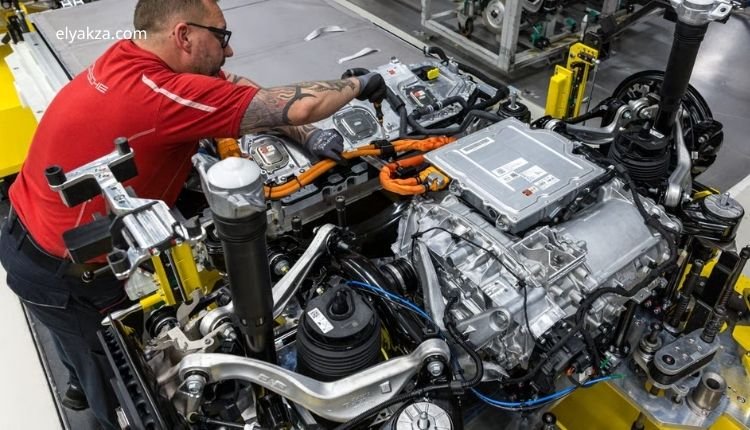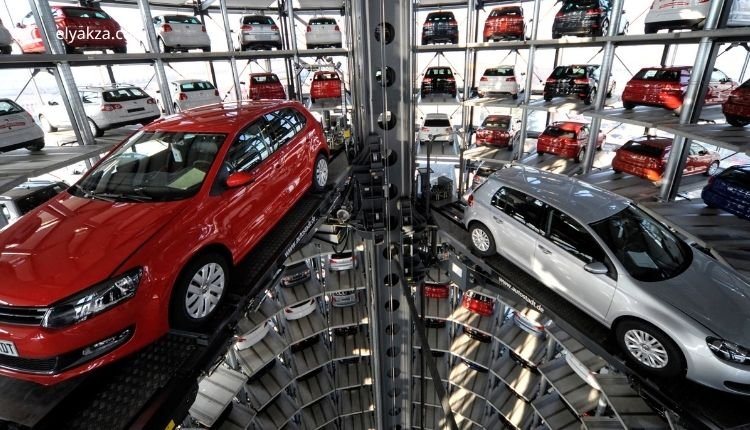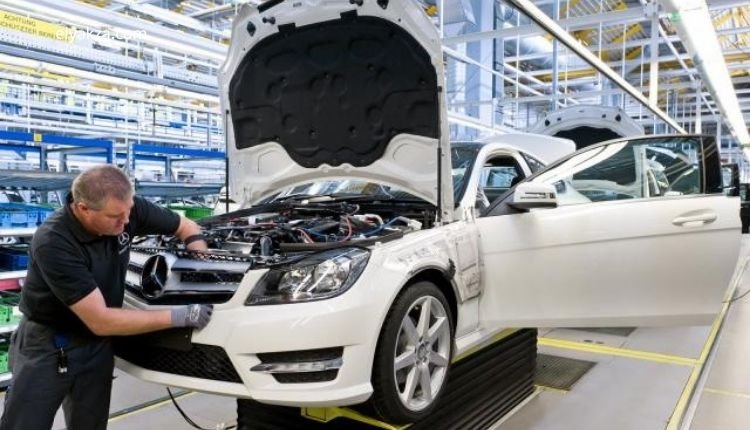The German automotive industry—once the pride of Europe and the beating heart of Germany’s economy—is now facing its most severe crisis in decades. Bavarian Prime Minister Markus Söder recently described it as “Germany’s destiny and the core of its economy—without it, collapse is inevitable.” His words, far from exaggerated, reflect a harsh reality backed by alarming data.
قائمة المحتويات
In August 2025, Germany’s industrial output dropped to levels not seen since 2005, with car production plunging by 18.5% compared to the previous month. For a nation whose identity and prosperity have long been tied to automotive excellence, this decline signals more than an economic slowdown—it’s an existential threat.
The Decline of German Automotive Power
For decades, brands like Volkswagen, BMW, and Mercedes-Benz symbolized engineering perfection, reliability, and status. Today, however, these giants find themselves cornered between two unstoppable forces:
- Chinese electric vehicle (EV) manufacturers, producing high-quality, low-cost electric cars that are rapidly conquering global markets.
- The European Union’s zero-emission mandate, which bans the sale of new internal combustion engine (ICE) vehicles starting in 2035.
This double pressure has pushed German automakers into retreat, with factories closing for the first time in decades and tens of thousands of workers being laid off.
“Read Also: Jobs AI Will Replace“
Production Cuts and Factory Shutdowns
In late September 2025, Volkswagen announced a two-week production halt at its Zwickau plant due to weak demand for the Audi Q4 e-tron. Around the same time, the company considered suspending production at its Emden factory, where it builds the ID.4 and ID.7 electric models.
Similarly, Bosch, one of the world’s largest automotive parts suppliers, revealed plans to cut 13,000 jobs over the next five years. These are not isolated cases—this is a nationwide trend. Almost every major German automotive firm is battling declining demand, fierce Chinese competition, and high operating costs.
“Read Also: Your Phone Is Hacked“
The Chinese Electric Vehicle Invasion

China’s Technological Lead
The Chinese auto industry has achieved what many thought impossible: global EV dominance. Companies like BYD and NIO have leaped ahead of European rivals by three to five years in technology, battery efficiency, and production scale.
As BYD CEO Wang Chuanfu stated, Chinese automakers are now years ahead of foreign competitors in both innovation and industrial efficiency. In China, a new EV model is launched every two days, an astonishing pace that keeps even the most established brands struggling to keep up.
Price and Market Pressure
China’s strategy is brutally effective—undercut the competition. Chinese brands offer advanced EVs at prices significantly lower than German counterparts. This aggressive pricing, combined with rapid innovation, has reshaped consumer preferences both in China and abroad.
Even in markets where German cars were once aspirational, like China itself, consumers now favor local brands. The appeal of Mercedes, Audi, and BMW is fading as younger buyers choose cutting-edge, tech-driven Chinese alternatives.
“Read Also: AI in Drone Defense“
Trade Wars and Tariffs: The American Blow

While the Chinese challenge dominates headlines, the United States has also become a source of pain for Germany’s carmakers. In March 2025, U.S. President Donald Trump imposed a 25% tariff on imported vehicles, up from the previous 2.5%.
The impact was immediate: Volkswagen lost $1.5 billion in the first half of 2025 due to slumping U.S. sales. Though negotiations eventually reduced tariffs to 15%, the damage was already done. For export-reliant automakers—three out of every four German cars are sold abroad—such disruptions are devastating.
“Read About: Cloud Virtual Machines“
The Internal Combustion Crisis
Germany’s automotive might was built on internal combustion engines (ICEs). But that foundation is now crumbling. In March 2023, the European Union approved a historic regulation banning the sale of new carbon-emitting vehicles by 2035.
This means that German automakers, long masters of diesel and gasoline technology, must reinvent themselves entirely within a decade. The challenge is immense: EV technology demands different supply chains, raw materials, and manufacturing methods.
While European automakers have invested billions in battery R&D, they remain far behind China, whose integrated ecosystem—from raw materials to finished vehicles—gives it a massive advantage.
The Energy Cost Crisis
Another major blow to German industry came after Russia’s invasion of Ukraine, which cut off cheap Russian gas—the lifeblood of German manufacturing. Since then, energy costs have soared, eroding profit margins across the automotive sector.
According to Ernst & Young, between June 2024 and June 2025, the German car industry lost 6.7% of its workforce, equivalent to 52,000 jobs. Even worse, two-thirds of German auto parts suppliers now plan further layoffs, and 80% have postponed or canceled investments.
Between a Rock and a Hard Place

The German automotive industry stands between the hammer and the anvil:
- On one side, China’s unstoppable EV surge.
- On the other, Europe’s strict environmental deadlines.
If Germany fails to adapt by 2035, it risks losing its most valuable industry entirely. Automakers are now urging the government to delay or scrap the zero-emission deadline, arguing that the transition timeline is unrealistic.
“Read About: Cheap Homeowners Insurance Quotes“
Political Response: Can the Government Save the Industry?
In October 2025, Chancellor Friedrich Merz convened the Auto-Gipfel summit in Berlin, attended by top executives, labor unions, and policymakers. Merz pledged to “do everything possible” to overturn or soften the EU’s 2035 ban.
While his intentions are clear—saving Germany’s industrial core—critics warn that reversing the law could undermine investor confidence and harm Europe’s EV progress.
Over 150 European companies, including Samsung, Volvo, and Polestar, sent an open letter to the European Commission urging it to stick with the 2035 deadline, warning that any delay would “weaken Europe’s competitiveness and give global rivals, especially China, an irreversible edge.”
What Lies Ahead for Germany’s Car Industry
The path forward is uncertain. To survive, Germany must:
- Accelerate innovation in battery and EV technology.
- Invest in renewable energy to cut production costs.
- Form strategic partnerships with other European and Asian tech leaders.
- Reskill its workforce for the electric future.
Without rapid transformation, Germany risks losing not just its car industry—but the economic foundation that has defined it for over a century.
Frequently Asked Questions About the German Automotive Industry Crisis
1. Why is Germany’s car industry struggling?
It’s being squeezed by cheaper, more advanced Chinese EVs and strict EU emissions laws banning combustion engines by 2035.
2. How are Chinese automakers ahead?
They invested heavily in EV technology, batteries, and manufacturing efficiency, allowing them to launch new models faster and at lower prices.
3. What role do U.S. tariffs play in the crisis?
High tariffs on imported German cars have reduced competitiveness in one of their largest export markets.
4. Could the German government delay the EU’s 2035 ban?
Chancellor Merz is trying, but European automakers and investors warn that doing so could harm long-term innovation.
5. Can Germany regain its automotive leadership?
Only if it rapidly modernizes, embraces EV technology, and builds competitive renewable energy infrastructure.
German automotive industry: Conclusion
The German automotive industry stands at a crossroads. Once the symbol of European engineering supremacy, it now faces unprecedented pressure from global forces reshaping the car market.
Whether Germany adapts or collapses depends on how fast it can innovate—and whether it can find balance between preserving its industrial legacy and embracing a cleaner, electric future. One thing is certain: the road ahead will determine not just the fate of German automakers, but the future of Germany’s entire economy.
يتميز أحمد فتحي بكونه كاتبًا اقتصاديًا يعتمد على تبسيط المفاهيم الاقتصادية المعقدة وربطها بالأحداث اليومية التي تهم القارئ. يكتب بشكل احترافي عن النظريات الاقتصادية، الأسواق المالية، السياسات النقدية والمالية، مع تحليل معمق للأخبار والتقارير الاقتصادية العالمية والمحلية.
من خلال خبرته، يقدم أحمد فتحي محتوى يساعد القراء على فهم حركة الاقتصاد وتأثيرها المباشر على حياتهم اليومية، مثل التضخم، أسعار الفائدة، والتجارة الدولية. أسلوبه يجمع بين الدقة الأكاديمية والطرح السلس، مما يجعله مصدرًا موثوقًا للمهتمين بعالم الاقتصاد وصناع القرار على حد سواء.

